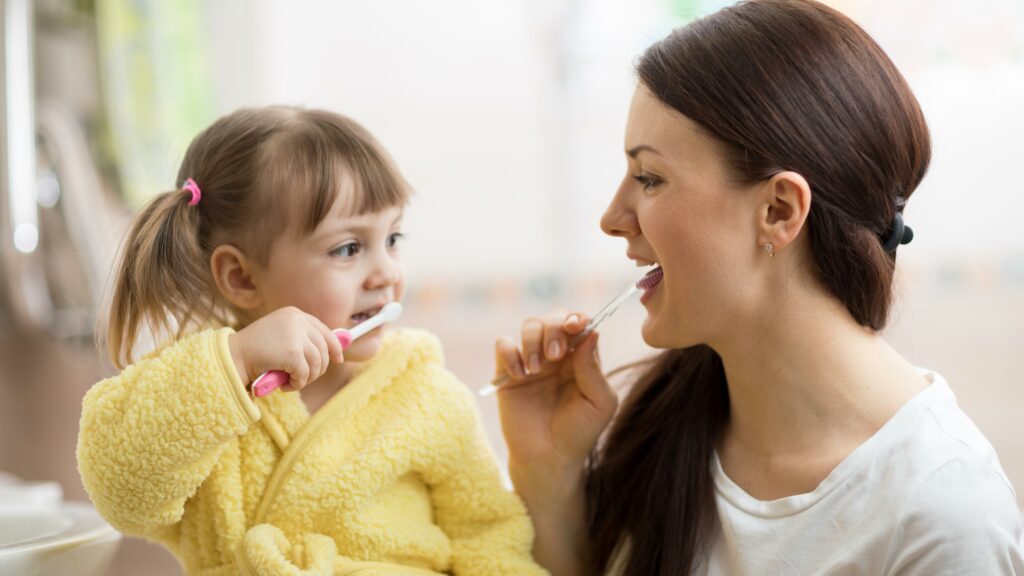Frequently Asked Questions About Pediatric Dentistry
Whether you have questions about pediatric dentistry in general, or about our practice specifically, Jenkins Dentistry for Kids is here to be your guide. Read on to learn the answers to some of our most frequently asked questions.
When Should I Start Brushing My Child’s Teeth?
Believe it or not, your child’s dental health routine should begin shortly after birth, months before their first teeth erupt. We recommend cleaning your baby’s mouth and gums with a soft cloth or infant toothbrush at bath time. This routine will also help prepare your baby for teeth cleanings to come. As your child gets older, their dental care will grow and change as well. For an age-specific guide, check out our blog: A Parent’s Guide to Dental Care.
At What Age Should Kids Brush Their Own Teeth Independently?
We tell our patients a good rule of thumb is if the patient is able to tie their own shoes, they should be able to brush their teeth on their own. This is typically at age seven or when they enter first grade.
How Often and How Long Should My Child Brush Their Teeth?
We recommend that everyone in the family brushes their teeth twice a day for about two minutes at each brushing. Toddlers may challenge you on this mission, but try your best to establish these healthy habits early and keep the momentum going. Eventually they’ll get on board. For more details, check out our blog: Real-life Brushing Tips for Infants and Toddlers. Keep reading on this page for tips on making teeth-brushing more fun for your kiddos.
How Long Is “Too Long” for My Child to Suck Their Thumb or Use a Pacifier?
Between the ages of two and four years old, most children will stop sucking their thumb, due to interest in other activities, peer pressure, or a mix of both. If your child is still sucking their thumb past the age of three, it’s recommended that you intervene and help them break the habit to prevent possible negative effects on their adult teeth. We offer Myofunctional therapy to kiddos who need help kicking the habit.
Learn more on our blog: How Can I Prevent My Child from Thumb Sucking?
Why Do Baby Teeth Matter If They Just Fall Out Anyway?
Baby teeth are vulnerable to decay from their very first appearance. For most babies, the first tooth will erupt between the ages of six months to a year. Proper care for your baby’s teeth is imperative throughout their growth and development. Teeth serve several critical functions, including speech. Your child’s baby teeth help the proper development of permanent teeth by holding space for them.
Why Do We Need to Fill Baby Teeth if They Won’t Be in My Kid’s Mouth Forever?
Leaving cavities long-term can result in infection; oral health is very important for systemic health.
Decay in the baby teeth affects your child’s health and behavior. The pain your baby can experience with decay can cause a loss of appetite or difficulty eating correctly. If tooth decay goes untreated, it can lead to an infection and fever, potentially causing loss of teeth and expensive restoration.
Do Kids Need to Floss Their Baby Teeth?
Just like brushing, flossing should be introduced early in your child’s oral health routine to both establish healthy behavior and keep their teeth clean. As soon as the teeth touch, flossing should begin.
When Should My Child Have Their First Dental Appointment?
Along with the American Dental Association (ADA) and the American Academy of Pediatric Dentistry (AAPD), Jenkins Dentistry for Kids recommends that pediatric dental patients are seen at either the eruption of their first tooth, or by their first birthday – whichever happens first.
Your child’s first visit to the dentist begins a trusting relationship with their dentist and establishes lifelong preventative dental care and habits. A scientific paper in Pediatric Dentistry revealed that children who wait to have their first dental appointment until the age of two or three are more likely to require restorative and emergency visits to the dentist.
What Happens at a Dental Appointment for Babies and Toddlers?
At Jenkins Dentistry for Kids, everything we do is tailored to you and your kiddo. We keep in mind your child’s emotional needs as well as their physical size and abilities, especially when it’s their first dental appointment ever. For a detailed run-down, please visit our blog: What to Expect at Your Child’s First Dental Appointment.
How Can I Make Teeth-Brushing Time More Fun for My Kids?
It’s important to set an example for your child and to stick with the routine yourself, but in order to really get your kids to brush their teeth consistently, we suggest adding a little pizzazz. Crank up the Fun-o-Meter! See our suggestions below:
Sing Songs to Hone Healthy Habits
YouTube has a plethora of great songs and videos to help your children get excited about brushing their teeth. These visuals and catchy tunes are sure to get your child moving and grooving:
- Brush Your Teeth Song – Songs For Littles
- Tooth Brushing Song – Blippi
- Brush Along With Budd! – Dr. Bob
- Brush to the Beat – Mickey Mouse
- Brush Your Teeth – Finny the Shark
- Brush Your Teeth – Super Simple Songs
- Brush Your Teeth Dance Along – Pink Fong
Read Books About Healthy Smiles
Dive into dental health through the magic of reading! Here are some fun books to get you started. Check out your local Johnson County Library to see what’s in stock!
- Brush Your Teeth Please (A Pop-Up Book), Jean Pidgeon
- Just Going to the Dentist, Mercer Mayer
- What If You Had Animal Teeth?, Sandra Markle
- Brush, Brush, Brush, Alicia Padron
- Sesame Street Ready, Set, Brush (A Pop-Up Book), Che Rudko
- The Tooth Book, Theo LeSieg (Dr. Seuss)
- The Berenstain Bears Visit the Dentist, Stan and Jan Berenstain
- Sugarbug Doug: All About Cavities, Plaque, and Teeth, Dr. Ben Magleby
Use a Sticker Chart Reward System
People are visual creatures. Perhaps your child just needs a tangible reminder and visual cue to remember to brush their teeth. You could print out a special brushing chart like this one from the ADA, or simply use your calendar to track their progress. Reward your child with a shiny new sticker to mark each time they brush their teeth for a full two minutes. What’s the end game here? That’s up to you! A new book, game, or even an ice cream outing could be just the motivator they need to ensure a healthy smile.
My Child Is Scared to Go to the Dentist. What Can I Do?
It’s important to make sure your child feels heard and knows that you have their back. You should acknowledge their fears and let them know it’s natural to be nervous, but they don’t need to worry. Set a positive tone before, during, and after your child’s appointment. When speaking of your child’s dental exam, keep it light and uplifting. Learn more on our blog: 5 Tips to Help Your Child Overcome Dental Anxiety.
What Is Fluoride Varnish?
It is a temporary layer made of Calcium and Fluoride on the enamel surface to help remineralize enamel. Learn more on our fluoride blog.
What Is SDF?
Silver Diamine Fluoride (SDF) is a targeted fluoride treatment that stops decay and helps to remineralize an area of decay on the tooth and slow the progression of decay.
What Are Sealants?
Dental sealants are a protective coating placed in the grooves of the molars to help prevent cavities on the chewing surface.
What Is Calculus?
No, we don’t mean the mathematical kind! In dentistry, calculus is a hardened buildup that can’t be removed by your toothbrush. It has to be removed by a tool called a scalar.
When Should Wisdom Teeth Get Removed?
Some people do not need them removed but we often evaluate our patients for removal around the age of 16-18.
How Does Diet Affect Dental Health?
Nutrition plays a significant role in your child’s dental health. A good diet is essential for your child’s overall growth and development, which includes their teeth.
Surprisingly, almost all foods, milk and fruit included, have some type of sugar, which can contribute to tooth decay. Help control the amount of sugar your child consumes by limiting the amount of additional, unnecessary sugars your child ingests. Be sure to read food labels carefully and choose foods and beverages that are low in added sugars. Learn more on these two blogs: Nutritional Tips and Best & Worst Drinks for Kids’ Teeth.
Where Is Jenkins Dentistry for Kids Located?
Jenkins Dentistry for Kids has two locations in the Kansas City metro: Shawnee and Lenexa. Our doctors float between the two locations, and both have friendly staff and comfortable, child-friendly waiting areas. Schedule an appointment today!
What Ages Do You Serve?
Our pediatric dental practice serves children from infancy all the way through their teen years. Pediatric dentistry is more than just a quick dental exam. It’s about establishing an ongoing relationship with you and your child and becoming your dental home. We have created an environment that is both fun and encouraging. Our friendly team of experts is specifically trained to handle your child’s needs while in the dental chair, from our chosen vocabulary to incentives for a job well done! Our mission is to educate children on the importance of good oral hygiene habits and set them up for a lifetime of healthy smiles.
How Can I Make An Appointment?
Ready to schedule an appointment? Awesome! We’re always happy to welcome new patients and their families. To request an appointment, please get in touch online or give us a call at either of our offices:
Shawnee: 913.745.2500 | Lenexa: 913.270.4220

